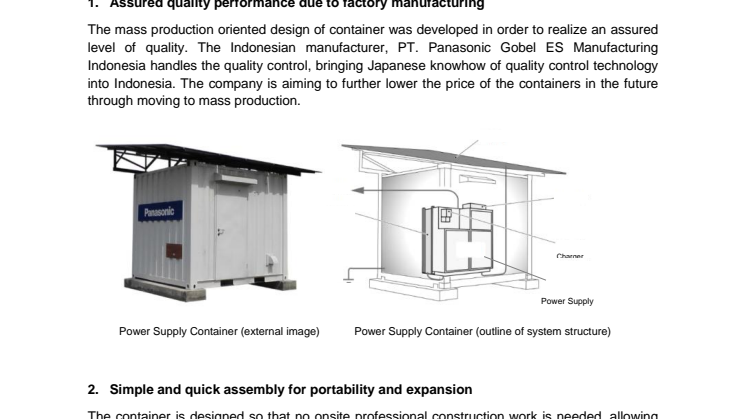Press release -
Embassy of Japan in Indonesia Selects Panasonic's Power Supply Container
Osaka, Japan – It was announced that the Project to Improve Elementary Education and Alleviate Poverty by Providing Electricity to Banjarsari Village, Pangalengan Sub-District, Bandung District, West Jawa Province, for which the stand-alone Power Supply Container developed by Panasonic will act as a power source, has been selected by the Embassy of Japan in Indonesia as a joint public/private sector project utilizing Grant Assistance for Grass-roots Human Security Projects.1
Power Supply Containers are stand-alone photovoltaic power packages developed for the markets with electricity-shortages. Each container contains solar cells, 2 lead storage batteries3 and also Panasonic's newly developed Power Supply Control Unit that acts as the energy management system.
This project has supplied a Power Supply Container to the National Elementary School Malabar 04 under the educational environment improvement policy for mountainous areas. The NGO FEDUs, located in Bekasi, Indonesia, is undertaking and providing support for this project to deliver the Power Supply Containers.
Banjarsari Village is situated in an area where electricity is available via a power company, but as the school is located in a tea plantation, it has been without power for 32 years. The school was thus unable to provide a sufficient educational environment utilizing IT, such as ordinary computers.
Panasonic will deliver a Power Supply Container to the National Elementary School Malabar 04, creating a better institutional and educational environment through providing power for school electrical equipment like lights and pumps as well as educational tools like computers, projectors, televisions and so on. Work is ongoing towards introduction of the containers in July 2015.
The Power Supply Container is equipped with twelve Panasonic HIT TM solar modules which have a high conversion efficiency and can generate approximately 3 kW of electricity. It is also equipped with 24 lead-acid storage batteries (17.2 kWh as total) which can supply stored power. This project will supply power to the electrical equipment in the school and classrooms during school time, while the excess energy generated out of school hours will be supplied to the local community, helping to stabilize the local power supply.
Panasonic aims to use the Power Supply Container as a solution for areas in Indonesia where the power infrastructure is an issue, such as areas without electricity or places facing frequent power blackouts, and envisions realization of a more enriched and better lifestyle.
The Power Supply Container will in the future be supplied to other Asian countries and emerging nations to bring electricity to every corner of the globe.
- Joint public/private sector projects using Grant Assistance for Grass-roots Human Security Projects: the provision of financial assistance in the form of ODA to relatively small-scale projects run locally by local public bodies, educational/medical institutions, NGOs and so on in developing nations. Ministry of Foreign Affairs of Japan provides support for corporate social responsibility of Japanese corporations to develop regional economies and socioeconomic infrastructure in countries undertaking such projects, particularly for cases run jointly by the public and private sectors.
- Panasonic monocrystalline hybrid solar cell modules ”HIT”
- Panasonic deep cycle valve-regulated lead-acid batteries
*HIT is a trademark of the Panasonic Group.
Related links
Topics
- Business enterprise
Categories
- corporate
- sustainability
- csr
- environment
- energy
- ODA
About Panasonic
Panasonic Corporation is a worldwide leader in the development and engineering of electronic technologies and solutions for customers in residential, non-residential, mobility and personal applications. Since its founding in 1918, the company has expanded globally and now operates about 500 consolidated companies worldwide, recording consolidated net sales of 7.74 trillion yen for the year ended March 31, 2014. Committed to pursuing new value through innovation across divisional lines, the company strives to create a better life and a better world for its customers. For more information about Panasonic, please visit the company's website at http://panasonic.net/.
About Panasonic Asia Pacific
Panasonic Asia Pacific provides the whole range of the brand’s products and solutions across the South East Asia and Pacific (APAC) region. The company focuses on promoting its Business-to-Business portfolio, such as in the field of energy solutions, whilst maintaining solid Business-to-Consumer growth, in line with the group’s global direction.
The region has 45 manufacturing sites, which hold as a key hub for Panasonic’s global production activities supporting the consumer, solutions and components and devices business. Based in Singapore, Panasonic Asia Pacific regional headquarter encourages locally-initiated energy solutions partnerships and businesses. Panasonic Asia Pacific will continue to promote green innovation and reduce its regional carbon dioxide emissions footprint in support of Panasonic’s global eco initiatives.

